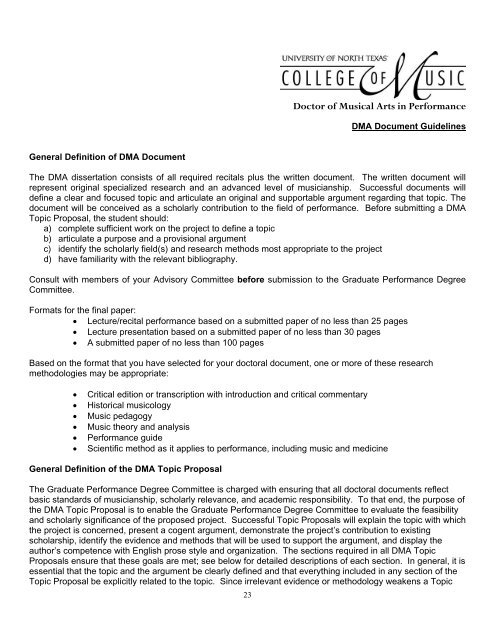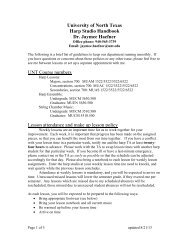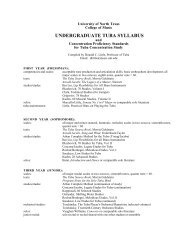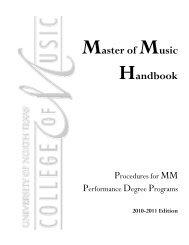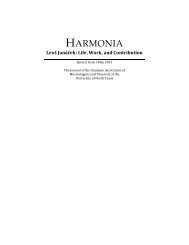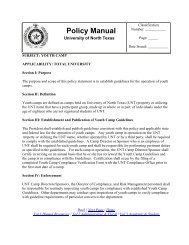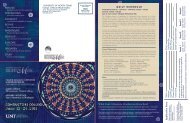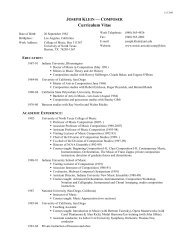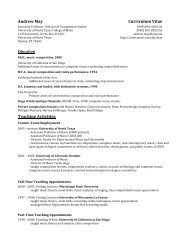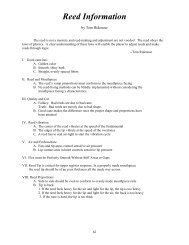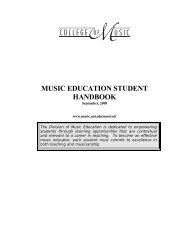Doctor of Musical Arts In Performance Handbook - UNT College of ...
Doctor of Musical Arts In Performance Handbook - UNT College of ...
Doctor of Musical Arts In Performance Handbook - UNT College of ...
You also want an ePaper? Increase the reach of your titles
YUMPU automatically turns print PDFs into web optimized ePapers that Google loves.
General Definition <strong>of</strong> DMA Document<br />
23<br />
<strong>Doctor</strong> <strong>of</strong> <strong>Musical</strong> <strong>Arts</strong> in <strong>Performance</strong><br />
DMA Document Guidelines<br />
The DMA dissertation consists <strong>of</strong> all required recitals plus the written document. The written document will<br />
represent original specialized research and an advanced level <strong>of</strong> musicianship. Successful documents will<br />
define a clear and focused topic and articulate an original and supportable argument regarding that topic. The<br />
document will be conceived as a scholarly contribution to the field <strong>of</strong> performance. Before submitting a DMA<br />
Topic Proposal, the student should:<br />
a) complete sufficient work on the project to define a topic<br />
b) articulate a purpose and a provisional argument<br />
c) identify the scholarly field(s) and research methods most appropriate to the project<br />
d) have familiarity with the relevant bibliography.<br />
Consult with members <strong>of</strong> your Advisory Committee before submission to the Graduate <strong>Performance</strong> Degree<br />
Committee.<br />
Formats for the final paper:<br />
• Lecture/recital performance based on a submitted paper <strong>of</strong> no less than 25 pages<br />
• Lecture presentation based on a submitted paper <strong>of</strong> no less than 30 pages<br />
• A submitted paper <strong>of</strong> no less than 100 pages<br />
Based on the format that you have selected for your doctoral document, one or more <strong>of</strong> these research<br />
methodologies may be appropriate:<br />
• Critical edition or transcription with introduction and critical commentary<br />
• Historical musicology<br />
• Music pedagogy<br />
• Music theory and analysis<br />
• <strong>Performance</strong> guide<br />
• Scientific method as it applies to performance, including music and medicine<br />
General Definition <strong>of</strong> the DMA Topic Proposal<br />
The Graduate <strong>Performance</strong> Degree Committee is charged with ensuring that all doctoral documents reflect<br />
basic standards <strong>of</strong> musicianship, scholarly relevance, and academic responsibility. To that end, the purpose <strong>of</strong><br />
the DMA Topic Proposal is to enable the Graduate <strong>Performance</strong> Degree Committee to evaluate the feasibility<br />
and scholarly significance <strong>of</strong> the proposed project. Successful Topic Proposals will explain the topic with which<br />
the project is concerned, present a cogent argument, demonstrate the project’s contribution to existing<br />
scholarship, identify the evidence and methods that will be used to support the argument, and display the<br />
author’s competence with English prose style and organization. The sections required in all DMA Topic<br />
Proposals ensure that these goals are met; see below for detailed descriptions <strong>of</strong> each section. <strong>In</strong> general, it is<br />
essential that the topic and the argument be clearly defined and that everything included in any section <strong>of</strong> the<br />
Topic Proposal be explicitly related to the topic. Since irrelevant evidence or methodology weakens a Topic


